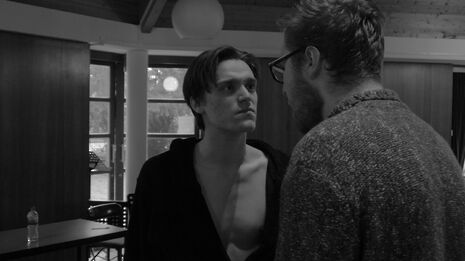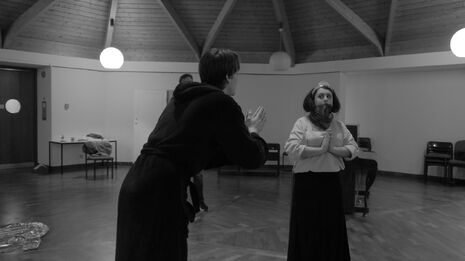Piranha Heights preview: ‘drama and viciousness’
Nick Collin is impressed by the fight choreography being prepared for this brutally naturalistic play

“Let’s go again from the eye-gouge, half-speed”. It is in the tight space of ADC’s Dressing Room One that I’m first introduced to the company working on Piranha Heights. I call it an introduction, but it’s not often that my first encounters feature the scratching and tearing, yelling, choking, and rolling on the ground that characterised this one. I arrived in the middle of a scrupulous run-over of the fight choreography, a technically complex moment in the play with four of the five-actor cast on stage, each working hard to listen carefully to each other while maintaining the fierce performance energy required.
This aggressive energy is happily broken up with laughter among the cast and directors, recognising the absurd experience of having to dip in and out of the violence demanded by the play. It was plain to see the ease with which the team worked together. Leaving the actors in the very capable hands of fight choreographer Jonathan Ben-Shaul, I took the chance to talk with Director Sophie Taylor.
The play was written by Phillip Ridley in 2008, and follows two brothers returning home to deal with the death of their mother, and what to do with her estate. It is set in the economic climate of the late noughties, with central plot-driving themes of economic desperation and homelessness. The director notes it is not explicitly a political play, however – but rather a story of two individuals, two men, wrestling with grief and obligation. In Taylor’s words, “it is a play about violence, delusion, and emotional repression”.

Sophie Taylor is opting for a very naturalistic production, the aim being to focus attention on the dialogue-driven drama between the players. With an intentionally bare set and only a handful of props, everything on stage has significance: a veil, a knife, a movement. This realist production is an extension of the play’s own structure. Running in real time and fixed in only one location, there will be very little to remove the audience from the drama and viciousness which they will be confronted with. It is shaping up to be a deeply affecting piece of theatre that aims to challenge – but certainly not for the feint-hearted.
Returning to the rehearsal once more, I see Benedict Clarke working through a precise strangle-struggle-scratch manoeuvre, happy to repeat again and again until there’s a total consensus that it looks right. And that it did; I know myself to be a little jumpy but even these fragments of choreographed violence caught my breath. Breath returned, I spoke with Clarke on his break about his character Terry. “A deeply paradoxical person,” he explains. Bitter but dutiful, deeply sceptical yet consumed by religion, he is desperate to try and keep everyone ‘afloat’ throughout the play. This manifests itself in Terry’s authoritative ownership over the space in a given scene, which Clarke rises to expertly.
Indeed, all the actors I had the chance to watch performed excellently, making the fights a colourful, visual spectacle imbued with artful rage. However, the play does not only shine in these moments of physical intensity: the emotional confrontations, use of space, and general ‘performance energy’ are all developing promisingly. This play will challenge and shock – not through gimmick, but through careful direction and the undressed acting of the small cast.
Piranha Heights is on at the ADC Theatre at 7.45pm, 23-27 January
 News / Report suggests Cambridge the hardest place to get a first in the country23 January 2026
News / Report suggests Cambridge the hardest place to get a first in the country23 January 2026 News / Reform candidate retracts claim of being Cambridge alum 26 January 2026
News / Reform candidate retracts claim of being Cambridge alum 26 January 2026 News / Cambridge ranks in the top ten for every subject area in 202623 January 2026
News / Cambridge ranks in the top ten for every subject area in 202623 January 2026 Comment / Cambridge has already become complacent on class23 January 2026
Comment / Cambridge has already become complacent on class23 January 2026 News / Palestine activists project slogans onto John’s24 January 2026
News / Palestine activists project slogans onto John’s24 January 2026








